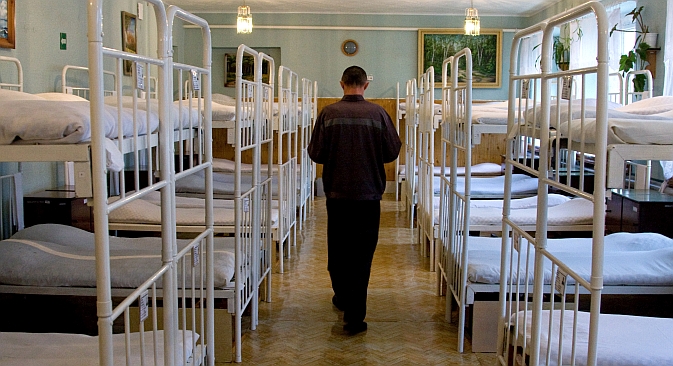Public-private partnership to help build new prisons

A private prison in Russia. Source: RIA Novosti / Vadim Braidov
The government wants to involve private investors in the construction of new prisons, in a bid to bring the lives of Russian inmates up to international standards. In light of lacking funds and in exchange for newly built prisons, authorities hope to offer private businesses urban lots for premium housing developments.
Related:
Painting with juvenile delinquents
Daughter of Pussy Riot member visits mother in prison
As part of a discussion on making the prison system more humane, Russian politicians have repeatedly voiced proposals to shift the burden of maintaining penitentiary institutions to the shoulders of private businesses.
Yet the government is not planning to set up American-style private prisons just yet. The deputy director of Russia’s Federal Penitentiary Service (FSIN), Nikolai Kolesnik, told journalists that the plan here is to create a public-private partnership to build new correctional facilities.
FSIN Director Gennady Kornienko had announced previously that his agency was ready to use the experience of the UK, where private companies are actively involved in building new prisons.
One of the reasons for such an initiative proposed by Russian officials is the lack of funding available for developing the penitentiary system. According to Kornienko, only a handful of new prisons and remand centers were built last year.
FSIN hopes to compensate for the lack of funding by offering private businesses expensive lots in cities for premium housing developments, in exchange for building new prisons. The agency said that specific decisions on this might be made as soon as the end of 2013.
The FSIN proposals will require an amendment to the existing legislation, as it does not provide for prison construction based on public-private partnership. However, some lawmakers have already expressed their readiness to support such amendments if they are submitted to the State Duma.
“First of all, we must take care of turning Russian prisons from mediaeval, penal labor-camps into places where one can do time and get out alive,” said Vladimir Ovsyannikov, senior deputy head of the Liberal Democratic Party of Russia in the State Duma. “In existing prisons, people are broken physically and morally, which is why most of them have no chance of integrating back into society once they are freed,” the lawmaker said.
According to FSIN, more than 4,000 people died in Russian prisons last year. Overcrowding, poor sanitation and the low quality of medical services available to inmates are responsible for the high mortality rate.
FSIN hopes that prisons built by private companies will bring the lives of Russian inmates closer to international standards. Still, “VIP” cells where inmates can enjoy creature comforts for money are out of the question.
Reaction from human right activists to the idea of privately built prisons has been mixed. Lev Ponomarev, executive director of the For Human Rights movement, believes that “freshly painted walls in cells and clean clothes won’t resolve the problem of protecting convicts’ human rights.”
“Decent conditions need to be created in prisons, there’s no doubt about it. But reform of the penitentiary system should start with a purge of those officers who are inclined to violence against inmates,” said Ponomarev.
According to official data, 697,500 inmates were held in Russia’s penitentiary facilities as of February 1, 2013.
All rights reserved by Rossiyskaya Gazeta.
Subscribe
to our newsletter!
Get the week's best stories straight to your inbox